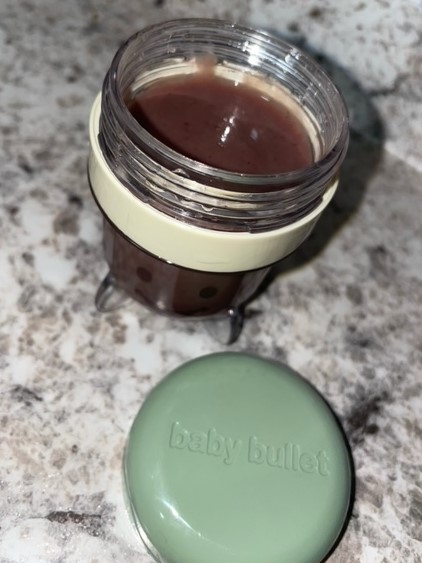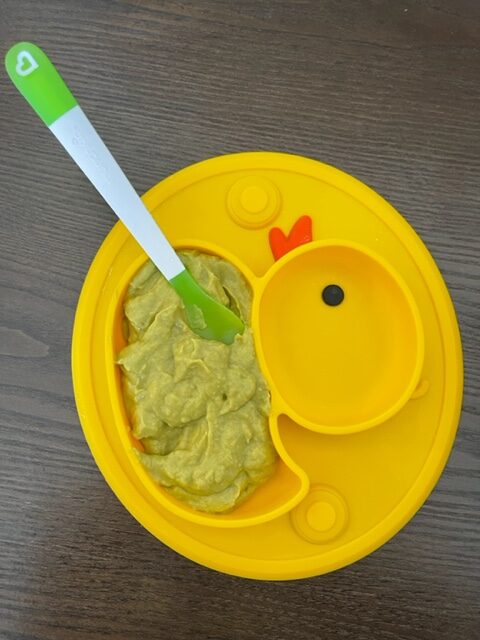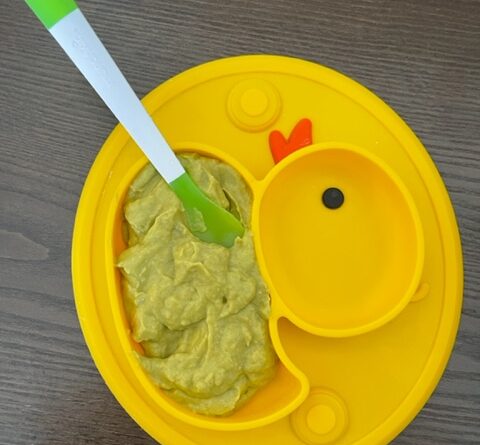The rise of homemade baby food
You know exactly what your baby is eating

Story and Photos
By Olivia Gregory
Knightly News Reporter
olivia.gregory@mymail.centralpenn.edu
Commercial baby food began appearing in stores in the late 1920s, according to Amy Bentley, author of “Inventing Baby Food: Taste, Health, and the Industrialization of the American Diet.”
Trends of feeding babies came and went before that, though.
In the late 1800s, babies weren’t introduced to baby food until 11 months old. By the 1950s, according to solidstarts.com, the age plummeted to 4 weeks. Health organizations, including the American Academy of Pediatrics, now recommends introducing babies to solid foods at 6 months.
The idea to create baby food as we know it now came from a man from Rochester, New York, named Harold Clapp. His wife became ill and couldn’t care for their baby, so Clapp improvised and found a way to properly feed his child, according to solidstarts.com says.
Clapp developed a soup of beef broth, vegetables and cereal. His soup became a huge hit, so he began making large batches to sell to other parents and local drugstores.
Gerber and other companies followed suit.
As the baby food market grew, companies began adding ingredients, some of them artificial, to enhance consistency, taste and texture. Packaged formulas also became popular.
With the rise of interest among parents in natural and organic foods in the 1960s and 1970s, according to Bentley and solidstarts.com, mothers making their own baby food became common.
Home cooking develops the palate

baby food the author whipped up in a Baby Bullet blender serving dish.

Numerous studies show that the more variety of tastes, textures and colors babies are exposed to, the more likely they are to accept new foods as they grow.
Homemade baby food is a popular option for parents who want to know exactly what goes into their babies’ mouths, according to webmd.com.
Many advantages come from homemade baby food. For example, it’s a money-saving and eco-friendly alternative to store-bought baby food.
An article by Stephanie Strom in The New York Times gives insight to new mothers who begin feeding their children a large variety of foods.
Strom discussed, for instance, mothers who begin taking baby food-making into their own hands.
“Thanks to mothers like these, sales of commercially prepared baby food have been steadily falling since 2005,” Strom wrote. “But the baby food industry is hardly waving a white diaper. Instead, it is competing head-on with mom’s kitchen.”
Pros of homemade baby food
- Parents know what’s going into their babies’ bodies
- Making baby food is less expensive than prepackaged food
- Parents can choose their own fruits and vegetables to create more flavors, compared to what store-bought brands have to offer
- Babies are exposed to more food flavors and textures
Cons of homemade baby food
- Making it can be time-consuming
- It can be less convenient, compared to prepackaged and premeasured cans of baby food
- Limited storage space may be an issue because homemade baby foods require immediate refrigeration
Pros win!
Making your own baby food doesn’t take much skill, supplies or research.
Here are a few supplies that can make making homemade baby food easier:
- Steamer
- Steaming basket
- Electric blender
- Hand blender
- Potato masher
- Baby food jars
- Baby food pouches
- Freezer trays
- All-in-one system
- Baby food blender
Books provide guidance on how to make your own baby food are plentiful. Many include a wide range of recipes. Check your favorite bookstore or book-seller website.
A very educational and helpful book that is a complete guide to what, when and how to feed your baby and toddler is “Super Baby Food,” written by Ruth Yaron.
Even though companies such as Gerber and Beech-Nut have been making baby food for over 100 years, the best way to know exactly what is going into your baby’s body is to make your own baby food.
It’s fun, and your baby will like it, too.
Gregory is 9-month-old Delilah’s mom. She makes her food.
Have a comment or story idea? Contact KnightlyEditors@CentralPenn.Edu.
Edited by media-club co-adviser and blog editor Professor Michael Lear-Olimpi.



